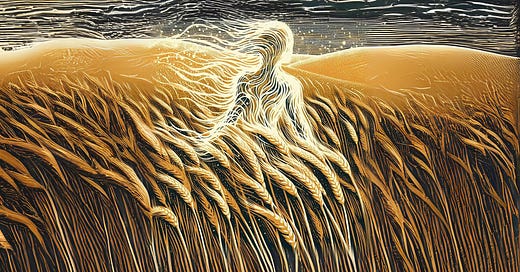If you prefer the audio of this article, click here.
To see a World in a Grain of Sand
And a Heaven in a Wild Flower
Hold Infinity in the palm of your hand
And Eternity in an hour– William Blake, Auguries of Innocence
In this article I want to do what no one else would think to do, and defend animism. But the original thought did not begin with animism. It began with something much more fundamental—it began with the desire to totally renovate and reorient our worldview, to modernize it and clear away all the clutter that has accumulated for thousands of years. Only after working through this more fundamental project did it become clear that the result was essentially animism. The oldest religious paradigm we have. Funny how that works.
The right is beset by a retarded allergy toward materialism and nature, preferring some realm supposedly “higher” than our day-to-day reality. To be clear, we do not endorse materialism because materialism is a kind of monism. But this allergy toward nature is founded on a total non-understanding of what nature even is in the first place.
Let us turn to our old friend, etymology. Our word nature is cognate to our word natal. From Latin natus (something “born”), nature implies birth, growth, change, flux—above all, life. To look upon nature is to see something alive. To think of the natural (as opposed to the supernatural) as “dead” has it exactly backwards, as we shall see. Opponents of naturalism think that if reality is exhausted by the natural, this means atheism and modernity. But this makes no sense, because that is exactly how ancient peoples saw it. All nature is alive. There are spirits in every tree, every field, in the upper air, in the depths of the earth, behind the hearth, above the doorway, and everywhere else you look, without exception. Nature is full of gods. We have absolutely no reason to think that our ancient forebears had need of some other realm in which to banish divinity from the world. Were they modernist atheists?
We see life in nature itself—or at least, we used to. This was the default religious orientation from the beginning. When you look at nature, you are not looking at something foreign, you are not looking at something that is dead, whereas you are alive. Nature always reflects you. In folkishness, you always see from a perspective, can never get “beneath”, “above”, or “beyond” it. That perspective—your worldview—colours the world. Maybe it even colours it in an ultimate way.
We tend to think of a worldview as something built up from a foundation. This is what supposed traditionalists do in trying to start from metaphysics. They call metaphysics the “study of being as such”, or “first philosophy”, and try to derive their whole categorical scheme from that. Metaphysics is the most objective foundation available—what foundation could be more solid than beginning from what is “out there”?
We should be skeptical that it really is a solid foundation though, because it has culminated in the least secure worldview in the history of the world—modernity. Starting from what is “out there” is far from being secure. Why start from the world, from (supposedly) “dead” physics? Would it not be more secure to start from where you are? Why not start from what is close? Why not begin from life?
Beginning from life means taking not metaphysics as the foundation, but biology. It means looking at nature through the lens of your particularity and embodiment. It is admitting that you start from a time and place—not taking a “view from nowhere”, not existing “everywhen”. It is admitting that your worldview is built up not from abstract categories that stand in transcendental relation to any possible experience, but by faculties and categories which have been handed to you, contingently, as a result of your biological history. Beginning from life means, in a word, folkishness.
Beginning from life rather than from metaphysics (or disembodied reason, which is the same thing), is a total worldview reorientation. It means recasting every body of knowledge in the light of radical thrownness. It means subordinating metaphysics, reason, science, religion, logic, and every other supposed foundation to life-history (and life-prehistory). It means subordinating all these things to tradition.1 Metaphysics has been demoted. It is no longer first philosophy. Ethics is first philosophy, in that ethics is an absolute command issued from tradition.






